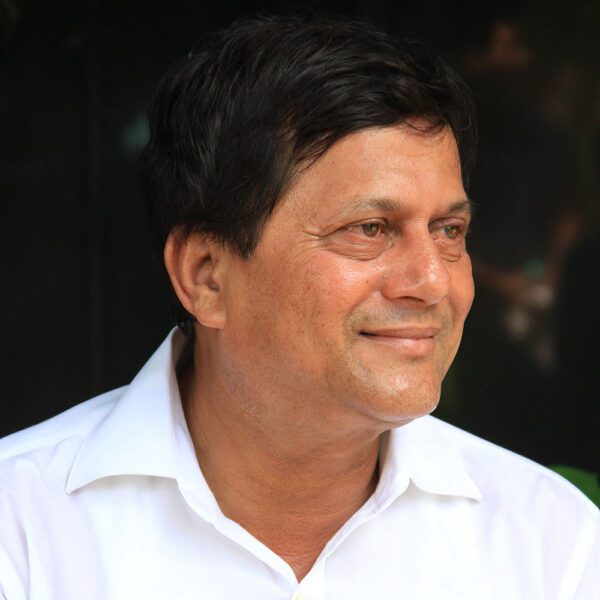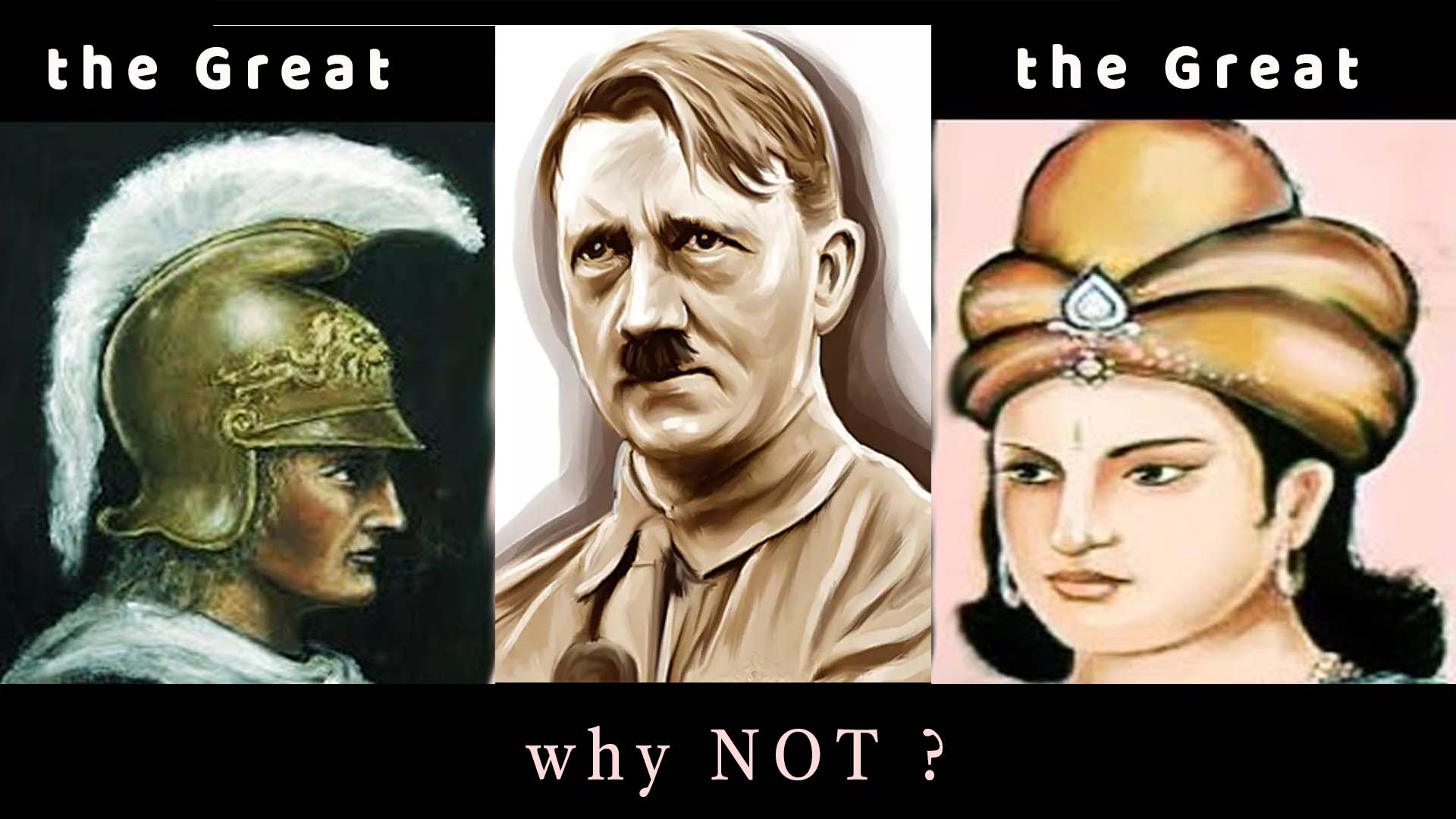It’s the irony of human civilization that the winners like Ashoka and Alexander became the GREAT whereas loser Hitler could not though all three share a common legacy of mass murder and ethnic cleansing. It is obvious that everyone bows to the power and worship the rising sun. After all historians are common people like us, prone to fear and reward, hence eulogise their masters because of the tendency of power worshiping. History of common people was never written. Only we read the political history and see the prevailing society through the prism of the ruling powers.
If Hitler would have won the World War II and would have become the Master of the World, the so-called liberal leftist historians would have shifted their positions to project the larger than life image of Hitler thereby making him Great because of two big sticks –fear and reward.
History is always subjective and historians project views couched with their personal prejudice.
Hitler found opportunity in the volatile political spectrum of Germany after the humiliation of Versailles Treaties of World War –I. He rose to power by instigating the nationalist fervour and reinstating the lost pride, brought political stability and rescued his countrymen from the Great Depression of 1930s through progressive economic measures. But later on, he did of folly of indulging in the chauvinism for racial supremacy and imperialistic expansionism which led to the ghastly holocaust of Jews and his ultimate fall.
Whereas Alexander and Ashoka first let their imperialistic ambition to annihilate millions of people and later as charismatic winner shaped their own history in glorified words.
After taking the reign of Macedon at the age of 20, King Alexander, spent most of his ruling years on an unprecedented military campaign through Asia and northeast Africa, and by the age of thirty he had created one of the largest empires of the ancient world, stretching from Greece to North-Western India. He was undefeated in battle and is widely considered one of history’s most successful military commanders. After invasion of India in 326 BC, he was eventually turned back at the demand of his homesick troops. Alexander died in Babylon at the age of 32 after which a series of civil wars tore his empire apart, resulting in several states ruled by his surviving generals and heirs. His ardent greed for conquest pulled down civilizations of Egypt and Persia, butchered many in India and ultimately brought destabilization in his own empire. Alas, Alexander, the killer, was adorned as the GREAT because of the power of his sword.
Now, I want to throw some light in the context of Emperor Ashoka’s conquest of Kalinga. The pair of words “Ashoka-Kalinga” is faulty but no objection has been raised by any historians. The word ‘Ashoka’ denotes a name of an individual King whereas Kalinga stands for the name of the place or territory. Exact pairing would have been Maurya- Kalinga war or Ashoka Vs ??? (the anonymous King/General) war. Question arises here is that Ashoka’s Mauryan army fought with a valiant army of Kalinga led by whom. Going by the massive casualities and horrific consequences of the Kalinga War which became a turning point in world history there might be someone (King/General) who resisted fiercely the expansionist’s forces of Ashoka. What was his name? Ashokan army didn’t fought with ghosts. There might a King/Chief Commander who led the fierce resistance to one of the mightiest person on the earth. Unfortunately for being a loser his name might have been erased in the annals of history by the historians of the conquering forces to ensure the mighty name of the Victor Ashoka remains forever. Once again the credentials of the vanquished were wiped out to glorify the conqueror.
To control the vast maritime trade route of Kalinga, its conquest was paramount politically and economically for the land-locked Mauryan Empire as policy of territorial expansion. Even Chandraputa and Bindusara failed to subjugate Kalinga despite numerous attempts. There existed also hostility among traders of both the regions. Hence, Ashoka might have set himself for the task to satiate his imperialistic ambitions. The trigger of war might be the official refuge of one of Susima’s brother in Kalinga which enraged Ashoka immensely. When Kalinga defied the diktat of Ashoka to submit before his supremacy, he used coercive tactics by sending his forces which was completely routed by the Kalingan army. Ashoka, baffled at this defeat, attacked with the greatest invasion ever recorded in Indian history until then. The conquest of Kalinga at the eastern coast of India by Ashoka in the year 261 BC was an event of greatest historical importance for India and world history. It brought to completion the rise of the Maurya kingdom as the first pan-Indian state.
The horrific account of the war is mentioned in the Shahbazgarhi version of the Ashokan Rock Edict XIII which says,
“When King Devanampriya Priyadarsi had been anointed eight years, (the country of) the Kaliṅgas was conquered by (him). One hundred and fifty thousand in number were the men who were deported thence, one hundred thousand in number were those who were slain there, and many times as many those who died. Now that (the country of) the Kaliṅgas has been taken, Dēvānaṁpriya (is devoted) to a zealous study of morality, to the love of morality, and to the instruction (of people) in morality. This is the repentance of Dēvānāṁpriya on account of his conquest of (the country of) the Kaliṅgas.”
It is interesting to know that the Ashokan Rock edit in Dhauli and Jaugada in Odisha known as Kalinga Edict do not have mention of the Emperor’s ghastly statistics of the war whereas other Rock edicts across India have.
Out of curiosity, few years back I asked one of the Professor of Raipur University, “Was Ashoka really changed?” to which I got the answer that he was a politician first who need to control his Empire. Since, he has nothing left to conquer, he made aware his subjects the deeds in Kalinga through Rock Edicts with a veiled threat not to let Priyadarshi repent once again.
As a PR professional, when I think of Emperor Ashoka who killed his brothers to ascend to the throne and killed millions in Kalinga to expand his territory, he might have thought of his image makeover as he had nothing left to conquer and by that time he had developed a sense of guilt. With his authority he provided royal patronage to Buddhism, united all its existing schools and sent out messengers across world through the captured maritime trade route of Kalinga to propagate Buddhism worldwide. So, it might be his PR stunt to nullify his misdeeds and carve a niche for himself in history through his power. Since, he was a winner and was very powerful, he was GREAT.
Today also our intellectuals eulogize Great Powers of the World despite their botching up in Vietnam, East Europe, Afganistan and most recently Middle-East.
I am not an historian, just an engineering graduate with career in public relations and marketing, hence I use my own prism of logic and pragmatism to analyse history. History is subjective and hence, I have an opinion.
- (An article by Sameer Kumar Das)
(The author Sameer Kumar Das works at KIIT University, Bhubaneswar as Deputy Director, School of Languages)


